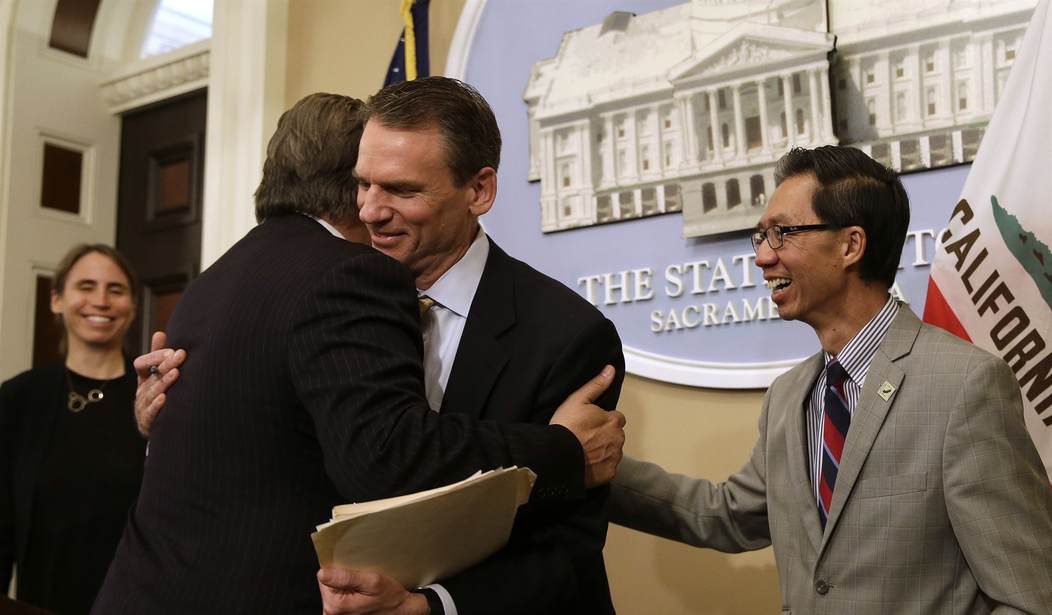Stop me if you’ve heard this one before. Entrepreneurs in the free market develop innovations that benefit consumers, only to have their efforts stopped by big-government regulators. It’s happened to countless major industries, and now progressive government regulators have their sights set on the internet. If allowed to continue with impunity, progressive regulations could stymie one of the fastest growing parts of the U.S. economy and put America’s tech leadership at risk.
Last June, California passed AB 375, or the Consumer Privacy Act, which will institute the most restrictive set of rules for internet companies in America when it takes effect in 2020. The goal of the bill is to increase transparency and protect consumer privacy when it comes to online data collection. These are noble goals that I, and many other conservatives, support in theory. However, as with most progressive initiatives, the means to achieve these goals threaten to go too far and cause more harm than good.
That’s because these measures would impose a European-style regulatory structure on the American tech industry, one that is modeled after the European Union’s General Data Protection Regulation (GDPR). On October 10, the Senate Committee on Commerce, Science, and Technology held a hearing to discuss the potential impacts of policies like California and the EU’s. Much of the effects aren’t fully known, but what is known is that they would severely restrict the ability of consumers and businesses to engage in online markets and services.
Not only that, the bill makes it harder for companies to create advertising. This may not seem bad, but as Forbes writes, “Consider the nature of services like Hulu and Spotify. They offer a lower tier of service that’s either discounted or free by virtue of offsetting ad revenues… But what happens when you restrict Spotify’s ability to serve ads in an efficient way?... That in turn means one (or both) of two things going up: the cost of subscriptions, and/or the frequency of ads.”
Recommended
It’s also worth mentioning that these regulations wouldn’t actually protect privacy or functionally increase transparency all that much. The bill requires that our names be assigned to our information so that companies can reveal or delete the information upon request. Attaching our names (as opposed to simply an IP address) to our online information doesn’t sound like privacy to me.
So why should conservatives around the country care what left-wing regulators in Europe and California do? Well, because other states are sure to follow suit, and a federal push for more internet regulations will likely come next.
Don’t get me wrong, I support proper regulations on the internet and tech industry that protect consumer privacy rights and increase transparency, and I suspect many conservatives would agree. What I don’t support is blindly giving the heavy hand of big government the reins to one of the most important industries of the modern world. Doing so could have disastrous impacts.
There could be serious human consequences of a strictly-regulated internet. Right now, the internet provides an unprecedented ability for people around the world to speak freely and share information like never before. However, giving government more power over the internet could restrict free speech.
Don’t believe me? Take a look at the U.K., where online “hate speech” is considered a hate crime punishable by law. Imagine the ramifications: the government gets to decide what hate speech is, then they can punish you for what you say online. It’s easy to see the slippery slope here, and it’s also easy to see how the U.S. could get to the same point if we start giving the government too much regulatory power now. Giving the government a little power is like giving a mouse a cookie, they’ll always want more.
Conservatives shouldn’t sit idly by and give big-government progressives unlimited power to regulate the internet. While many internet regulations are needed to protect consumers and businesses, the potential for overregulation is simply too great. We should keep our eyes open and fight to ensure that any new regulations will protect American entrepreneurship and innovation.























Join the conversation as a VIP Member